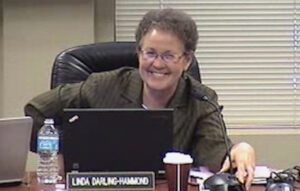New institute in Palo Alto aims to help shape state, national K-12 policy

SOURCE: CALIFORNIA COMMISSION ON TEACHER CREDENTIALING WEBCAST
Linda Darling-Hammond shares a light moment during a meeting of the California Commission on Teacher Credentialing.
A prominent scholar from Stanford University will direct a new education institute in Palo Alto whose mission is to influence K-12 policies in both California and the nation.
Linda Darling-Hammond, an emeritus professor at the Stanford University Graduate School of Education, is the president and CEO of the Learning Policy Institute, which formallyannounced its opening Wednesday. Along with headquarters in the San Francisco Bay Area, the institute has an office in Washington, D.C., an initial budget of $5 million and a staff of 30 that may grow to 50 within a year.
The new position will take most of Darling-Hammond’s time, although she will continue to teach occasionally as an emeritus professor at Stanford and to serve as chair of the California Commission on Teacher Credentialing. Patrick Shields, who managed research at SRI Education for two decades with a focus on California’s teaching force, will be the new institute’s executive director.
The San Francisco-based Sandler Foundation is the lead funder with the Atlantic Philanthropies, the S.D. Bechtel, Jr. Foundation, the Ford Foundation, the William and Flora Hewlett Foundation and the Stuart Foundation also providing initial support for the institute.
The institute has opened during a critical period for education policy nationwide and in California. Along with implementing the Common Core State Standards, California is transitioning to a new school accountability system and a financing system that targets substantially more money to high-needs students and shifts control over spending from the state to local school districts.
In Washington, Republicans and Democrats are struggling with aspects of the rewrite of the No Child Left Behind law. But their overall compromise would return more authority over education policy and accountability to the states. That will make it all the more important, Darling-Hammond said, for communities “to know what works and act based on that knowledge. States and the federal government need to be in the knowledge-sharing business,” and the institute will be a forum and conduit for that information, she said.
Independent and nonpartisan, the Learning Policy Institute will differ from most research institutions, Darling-Hammond said, in that it will combine original and existing research to focus on “pressing policy questions” and then will translate the findings so that federal, state and local policymakers and practitioners can adopt the recommendations and bring them to scale. A large focus of the institute’s work will be on California, she said.
She said the institute’s policy agenda will include:
- Examining effective designs for new schools with structures, curriculum and types of learning that young people will need to thrive in a “radically different, knowledge-based world economy.”
- Sharing early education programs with strong outcomes so that they can be brought to scale. There is an emerging bipartisan recognition nationally of the importance of early education, she said.
- Making recommendations and sharing research on how to attract, train and effectively retain the next generation of teachers; California and other states are already experiencing a diminishing supply of prospective teachers.
- Helping to shape an “equity agenda” that draws attention to the United States’ high rates of child poverty and homelessness and unequal school funding and staffing, compared with other industrialized nations.
The timing may be right for a new institute focusing on these issues and for Darling-Hammond. An early education adviser to President New institute in Palo Alto aims to help shape state, national K-12 policy | EdSource:
